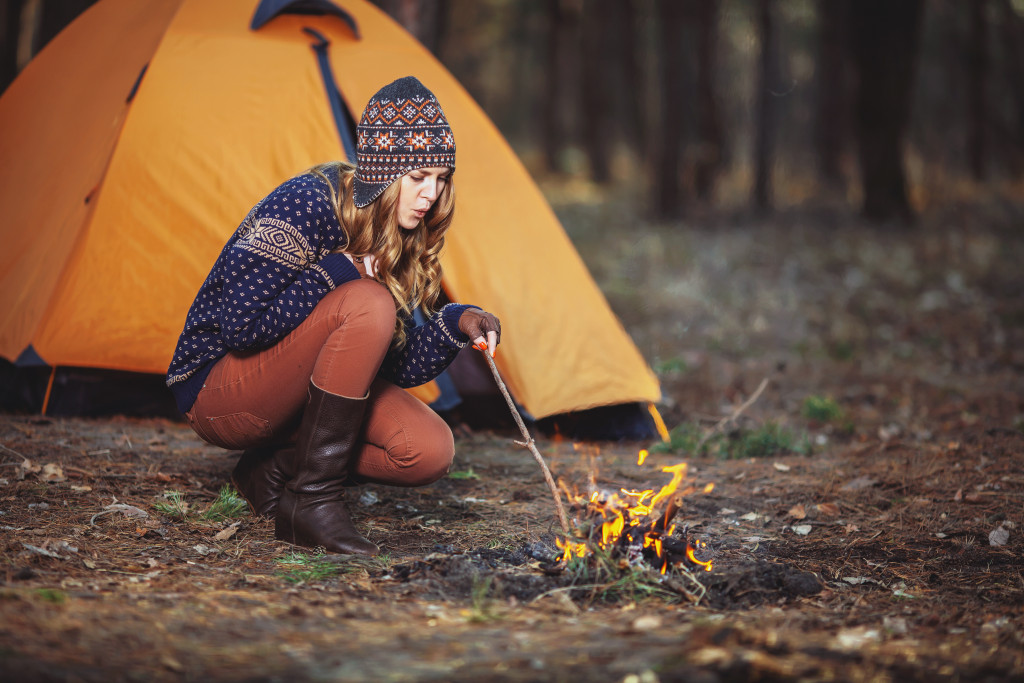- Mastering packing light for camping involves choosing versatile, essential, and lightweight items.
- Limit food items to lightweight, nutritious options and minimize toiletries to essential, travel-sized products.
- A smaller backpack can help limit your gear and force you to prioritize essentials.
- Effective packing for a lightweight camping trip can significantly enhance your overall outdoor experience.
Imagine you’re about to embark on an exhilarating camping trip. You’re excited, but there’s one daunting task ahead: packing. The art of packing light is a skill you need to master. It’s not merely about cramming everything into your backpack but selecting the right gear – versatile, essential, and lightweight items. Explore how to keep your load light without compromising on your camping needs.
Start with a list.
Creating a comprehensive list is your first step towards achieving a lightweight backpack for your camping adventure without missing out on any essentials. Here are some tips:
Choose multi-purpose gear.
When it comes to choosing gear, multi-purpose items are your best friend. For instance, consider packing a multi-tool that includes a knife, can opener, screwdriver, and scissors. Choose a camping cookware set that nests together to save space, and don’t forget a flashlight that doubles as a phone charger. Clothing should also serve multiple purposes.
Pack items that can be layered for warmth or worn alone in hot weather. Opt for fabrics that dry quickly and resist odors. Also, think about adding a lightweight hammock to your gear. It is a comfortable lounging spot during the day and can also be used as a makeshift rain cover or carry bag. Emphasize functionality and versatility while packing; you’ll find your backpack lighter and your camping experience more enjoyable.
Opt for an ultralight quilt.

Instead of a traditional sleeping bag, consider packing an ultralight quilt. They are surprisingly warm, easy to pack, and significantly lighter than most sleeping bags. Ultralight quilts are designed to the hiker’s needs, focusing on providing comfortable sleep while reducing pack weight. They wrap around your sleeping pad, providing needed warmth while reducing excess material.
Many are made with down feathers, which offer outstanding insulation and compressibility. These quilts also offer versatility – they can be fully opened during warmer nights or cinched tight when the temperatures drop.
Moreover, their lightweight and compact size frees up valuable space in your backpack for other essential items. Thus, an ultralight quilt is a multifunctional gear that enhances your camping experience by ensuring a good night’s sleep and a lighter backpack.
Pack lightweight clothing.
In selecting clothing for your camping trip, go for lightweight, durable, and suitable for layering. Synthetic materials or lightweight wool are excellent choices due to their quick-drying properties and ability to regulate body temperature. Moreover, they tend to be lighter than cotton and more resistant to wear and tear. A base layer for warmth, a middle layer for insulation, and an outer layer for protection from the elements are essential.
Another tip is to pack enough for a week, even if you plan to be away for longer. You can always wash and reuse clothes. Prioritize essential items like a lightweight rain jacket, a sun hat, and reliable hiking boots. Remember, the objective is to carry as little weight as possible without compromising comfort or safety.
Limit food items.

While it’s crucial to pack enough food for your camping trip, it’s equally essential to consider the weight and bulkiness of the items you select. Opt for lightweight, non-perishable food, such as dried fruits, nuts, and energy bars, which provide necessary nutrition without adding much weight.
Consider freeze-dried meals, which are compact, lightweight, and merely require adding hot water to prepare. Whenever possible, remove excess packaging at home before your trip. Also, plan your meals meticulously to avoid carrying unnecessary food. Remember, the goal is to minimize the weight of your backpack without compromising your nutritional needs during the camping trip.
Ditch extra toiletries.
In addition to the mentioned tips, it’s important to scrutinize your toiletries when aiming to lighten your backpack. Often, travelers take along full-sized toiletry products, adding unnecessary weight. Opt for travel-sized versions of essential items like toothpaste, soap, and sunscreen. Better yet, consider biodegradable alternatives that are eco-friendly and multifunctional, like a biodegradable soap that can be used for bathing, laundry, and dishwashing.
Don’t forget a small, quick-drying towel – another space-saver. Lastly, limit heavy or bulky items like glass containers by transferring their contents into lightweight, reusable bottles. These subtle changes can significantly impact your pack’s overall weight, enhancing your camping experience. Remember, every ounce counts when it comes to a lightweight backpacking trip.
Use a smaller backpack.
Another crucial tip to keep in mind for a lightweight camping trip is to use a smaller backpack. Opting for a smaller backpack will inherently limit your carry gear, forcing you to prioritize essentials and trim down on surplus items. Remember, the goal is not to fill all the available space but to carry only what is necessary.
Additionally, modern backpacks designed for hiking and camping often come with features that enhance comfort and distribution of weight. Look for a backpack with an adjustable harness to ensure a good fit, padded shoulder straps for comfort, and multiple compartments for efficient organization.
Don’t forget to use the external straps for sleeping pads and water bottles. Choosing the right backpack for your camping adventure can significantly impact your overall experience, ensuring comfort and mobility while you explore the great outdoors.
In conclusion, refining your packing skills for a lightweight camping trip is an art and a science. Selecting versatile, lightweight, and essential gear will ensure a more enjoyable and less strenuous adventure. Now, take these tips to heart, start packing smarter, and get ready to embrace the beauty of the great outdoors with ease and comfort. Happy camping!
